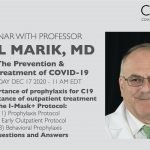It seems we can’t find what you’re looking for. Perhaps searching can help.
SHORT POSTS

Newsletter
Trending
- The Missing Pillar in Our Response to the COVID-19 Pandemic
 by Covexit November 9, 2020 by Peter A. McCullough, MD, MPH, FACC, FACP, FAHA, FCCP, FNKF, FNLA, FCRSA1 2 3 4 5 1Baylor University Medical… (106)
by Covexit November 9, 2020 by Peter A. McCullough, MD, MPH, FACC, FACP, FAHA, FCCP, FNKF, FNLA, FCRSA1 2 3 4 5 1Baylor University Medical… (106) - Webinar with Professor Paul Marik: the Prevention & Outpatient Treatment of C19
 by Covexit December 17, 2020 Today, there is a crisis in hospitals in the US and many other countries, where C19 is not treated before… (235)
by Covexit December 17, 2020 Today, there is a crisis in hospitals in the US and many other countries, where C19 is not treated before… (235) - Dr. Malone in the Footsteps of Dr. McCullough on the Joe Rogan Show
 by Covexit December 31, 2021 Here is the episode with Dr. Robert Malone https://open.spotify.com/episode/3SCsueX2bZdbEzRtKOCEyT?si=BfG-zUiqT6mEW7-TxyKIAA And here is the podcast episode with Dr. Peter McCullough, if… (163)
by Covexit December 31, 2021 Here is the episode with Dr. Robert Malone https://open.spotify.com/episode/3SCsueX2bZdbEzRtKOCEyT?si=BfG-zUiqT6mEW7-TxyKIAA And here is the podcast episode with Dr. Peter McCullough, if… (163)
Twitter feed is not available at the moment.
About this Blog
This is a blog by Jean-Pierre Kiekens, an Oxford graduate and former university lecturer, presenting opinions, news and independent policy analysis about the pandemic with focus on early treatments. This website does NOT provide any therapeutic advice. For that, please refer yourself to your doctor or health care provider.
The Covexit.com Podcast

For more news and discussions, join our (uncensored) group!

And we also have a group on Telegram!


